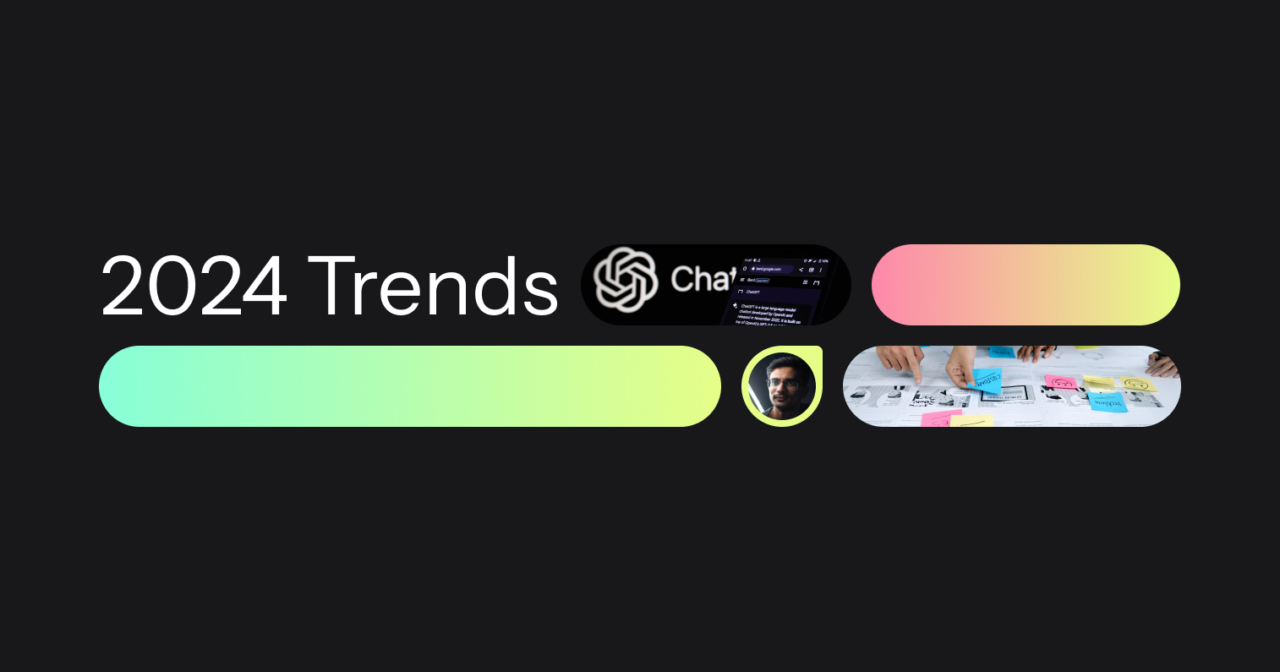2024 Customer Engagement Trends: Insights From 20+ Reports
A lot can change in a year. To help you stay ahead of the curve, we have read and extracted the 8 major customer engagement trends from over 20 top 2024 forecast reports. These reports cover predictions across consumer behaviors, technology, marketing, and customer experience. What did we learn? 2024 will reshape how businesses engage […]

A lot can change in a year. To help you stay ahead of the curve, we have read and extracted the 8 major customer engagement trends from over 20 top 2024 forecast reports. These reports cover predictions across consumer behaviors, technology, marketing, and customer experience. What did we learn? 2024 will reshape how businesses engage with customers and enhance customer lifetime value.
We hope the insights below give you a clear direction and strategies for creating a competitive advantage.
2024 Customer Engagement Trends
1. Human connection will be the key to successfully integrating AI into customer experiences
2. Non-personalized customer experiences will no longer resonate
3. Brand trust will continue to decline
4. Top service will beat low prices
5. Customers will expect high quality experiences across the customer journey
6. Brands will have to do more with less data and feedback
7. The beginning of the end of social media (as we know it)?
8. Consumers will change how they search for information
1. Human connection will be the key to successfully integrating AI into customer experiences
In 2024, most brands will begin exploring AI’s opportunities and threats. AI is a factor in the majority of customer engagement trends in 2024. Qualtrics reports consumer ambivalence towards AI, notably concerns about it replacing human interaction. Consumers prefer human channels for complex tasks and digital solutions for simpler ones. This preference underscores the need to align AI with individual customer preferences.
GWI reports a 36% annual increase in AI interest in the U.S., along with a doubling of concerns about AI. This trend indicates AI’s growing role in life and business, requiring businesses to empathize and adjust to consumer apprehensions. Increasing awareness of AI-generated media among consumers demands businesses to adapt and respond to these changing attitudes.
For businesses, these insights emphasize the importance of AI strategies that complement, not replace, human interactions. It’s crucial to recognize when customers prefer personal interaction over digital convenience. Knowledge-sharing communities offer a chance to sustain human connections and provide access to valuable information from trusted peers in situations where AI falls short.
2. Non-personalized customer experiences will no longer resonate
Businesses that excel in AI will use it to create more personalized, relevant, and valuable customer experiences, influencing consumer expectations. This trend, seen across various sources, represents a shift from generic audience mapping to “true” personalization addressing individual real-time needs and preferences. CX Network describes this as moving from customer personas to mindsets, focusing on specific needs and behavioral trends.
Marketing Week, CMS Wire and Optimove all highlight a shift towards nuanced personalization strategies. They highlight how data utilization makes it easier for businesses to predict customer needs and customize marketing efforts. Brandwatch goes further, identifying personalization as key to customer retention, increased profits, and brand loyalty. Optimove anticipates business leaders will invest in new engagement technologies in reaction.
Using AI and machine learning to understand individual customer preferences, can improve the customer experience, build loyalty, and drive growth. Community platforms will become essential interfaces for delivering these personalized experiences, ensuring the right content, people, and activities reach the right audience at the right time.
3. Brand trust will continue to decline
In 2024, experts predict low brand trust will significantly influence both B2C and B2B consumer behavior. GWI and the SOON Future Studies have shown a recent decline in public trust towards various institutions. In response, brands are moving towards more personalized and secure customer experiences. Forbes notes the use of generative AI and real-time data, including social media sentiment, for understanding and predicting customer behavior. However, if brands prioritize scalability over customer value, Gartner expects a rise in “acoustic brands” by 2027. These brands, making up 20% of the market, will reject AI in favor of authenticity and ethics.
Data privacy and compliance are increasingly becoming competitive advantages, with consumers favoring transparent and secure data practices. Optimove highlights the importance of building trust through transparency and personalization for brands.
Creating knowledge-sharing communities where customers can access and exchange verified information with trusted peers will demonstrate a brand’s commitment to authenticity and value.
4. Top service will beat low prices
Tough economic conditions will continue in 2024, but superior service is surpassing low prices as the key driver of customer loyalty. Qualtrics reports that 61% of consumer purchases now depend on product/service quality and 47% on customer service support, surpassing low prices at 43%. This key customer engagement trend indicates that companies providing excellent customer experiences are more likely to gain market share, even under tight budgets in both B2C and B2B markets. Forbes echoes this, observing that customers are willing to pay more for better experiences. Companies are shifting from price competition to offering valuable experiences that address specific challenges. Qualtrics also discovered that customers are 2.7 times more likely to return following a positive digital support experience, more than any other channel.
This data emphasizes the importance of helping potential and existing customers solve problems to drive loyalty and strengthen brand reputation. Create knowledge-sharing communities, where customers can engage with experts and peers, allows brands to balance trusted human support with effective self-service.
5. Customers will expect high quality experiences across the customer journey
Due to the community trends mentioned above, consumers will judge select businesses based on their ‘white-glove service’. HubSpot highlights the growing role of marketing leaders in enhancing every part of the customer experience, from awareness to onboarding and support, to foster loyalty through consistent, brand-aligned experiences. Forbes predicts businesses will need to expand into subscription-type services to boost loyalty.
Focusing on customer engagement and value creation throughout the lifecycle is essential for retention and upselling. Many brands struggle to maintain engagement across fragmented channels. Offering a customized, central destination for personalized knowledge sharing adds unparalleled value. PeerSignal reports that 58% of the world’s fastest-growing B2B brands are using communities to provide high-quality experiences throughout the customer lifecycle.
6. Brands will have to do more with less data and feedback
Andy Crestodina, Co-founder and CMO at Orbit Media, terms 2024 as the “low-data era” in an interview with Hubspot. He notes that evolving privacy laws and social media behavior changes will significantly reduce data availability. Forbes highlights the growing importance of sentiment-driven customer experience, where businesses must deeply understand and proactively respond to customer emotions for competitive advantage.
Qualtrics reports a 7.2 percentage point decrease in direct consumer feedback since 2021, leading to two-thirds of customers being less likely to communicate negative experiences directly. This trend calls for a more nuanced approach to understanding customer sentiments. These changes emphasize the need for innovative strategies in building and sustaining strong customer relationships.
Online customer communities provide a unique opportunity to combat this customer engagement trends. Zero-party data through profile creation is a huge benefit. They also allow brands to create a detailed map of individual and group interactions with content, people, and activities. When it comes to gathering qualitative feedback brand-owned platforms provide a more private setting for experiences to be shared.
7. The beginning of the end of social media (as we know it)?
Following on from the prediction above that evolving social media habits could create a scarcity of data, Gartner predicts dramatic changes in coming years. By 2025, they forecast 50% of consumers will drastically reduce their use of major social platforms due to concerns over quality and Generative AI’s potential to spread misinformation. This will lead over 70% of consumers to view AI as negatively impacting social channels, resulting in decreased trust.
Since Facebook’s expansion in 2006, social media has revolutionized the way brands reach new audiences and collect customer feedback. However, in 2024, many brands will need to reassess their social media strategies, focusing more on content authenticity and privacy to engage customers. Businesses that anticipated this shift have gained a competitive edge through brand-owned community platforms. These platforms, centered around specific topics, enable customers to share insights and build direct, meaningful relationships with trusted peers, reducing reliance on large, unpredictable social media platforms. Successfully maintaining consumer trust and adapting to changing preferences will become crucial in this evolving social landscape.
8. Consumers will change how they search for information
Generative AI is set to significantly impact SEO and content marketing strategies. HubSpot predicts that brands will shift from creating instructional how-to content to purpose-led, personality-driven thought leadership as GenAI tools become popular for users seeking quick solutions. Gartner forecasts that GenAI-powered search will cut organic site traffic for brands by 50% or more by 2028, leading marketing leaders to rethink content and channel strategies to stand out. Brandwatch anticipates that both B2C and B2B consumers will prefer engaging with verified humans and trusted peers due to a surge in low-value AI-generated content.
Predicting changes to Google Search algorithms is difficult, but these trends suggest authentic expert discussions and human-centric video content will likely rank higher in search results. This trend aligns with Kantar‘s concept of the “messy middle” of the customer journey, emphasizing the need for deeper customer understanding and personalization.
Instead of heavily scaling AI-driven content production, helping customers collaborate to solve challenges becomes essential for maintaining relevance and discoverability. Knowledge-sharing communities foster environments for sharing new insights that AI cannot replicate. As demand grows for instant, high-quality solutions to complex problems, communities of trusted experts are becoming invaluable assets for brands.
Conclusion
These customer engagement trends from over 20 top forecast reports point to a crucial year ahead, challenging businesses to revamp how they engage with customers. They must balance AI integration in customer engagement with a human connection to offer personalized experiences that align with individual customers’ preferences and goals. As brand trust dwindles, businesses need to prioritize authenticity, transparency, and high-quality service, rather than low pricing, to keep customer loyalty.
These customer engagement trends highlight the significance of knowledge-sharing communities for brands to sustain human connections at scale. They offer a clear strategy for using data and feedback to enhance products and services. By investing in and nurturing these communities, businesses can gain a competitive edge, even in rapidly changing and uncertain times.
If you would like to learn more about building a knowledge sharing community to maximize customer lifetime value, you can create a personalized community strategy or book a call with one of our community advisors.
